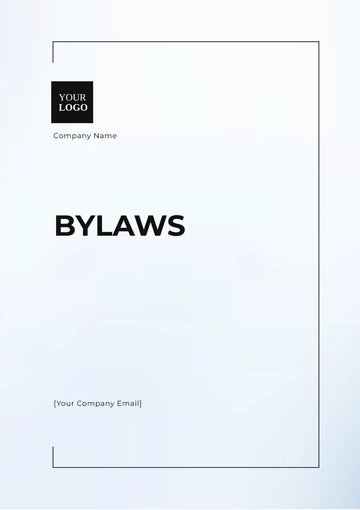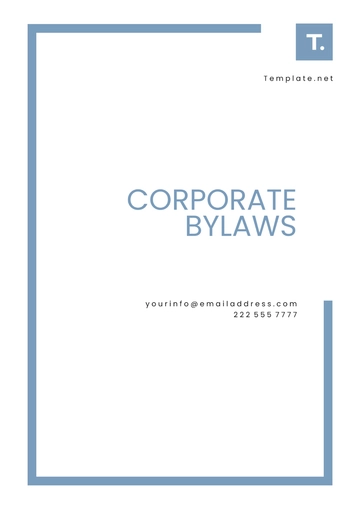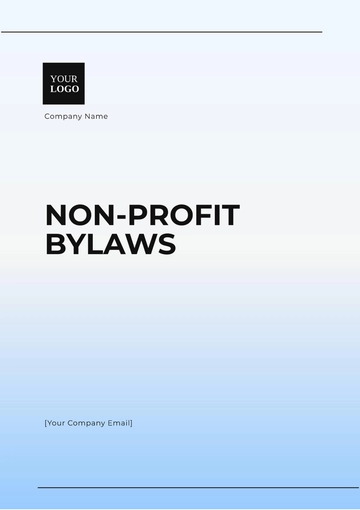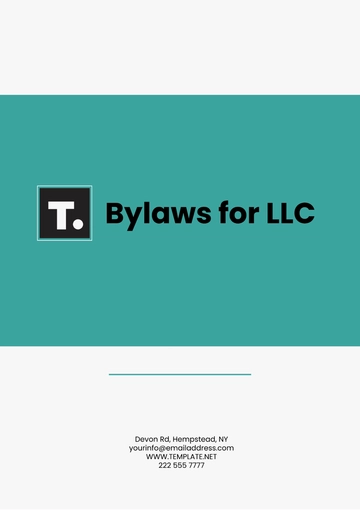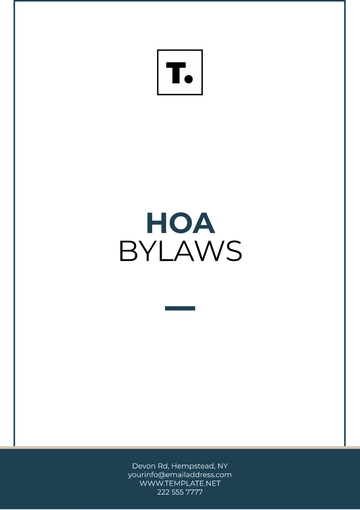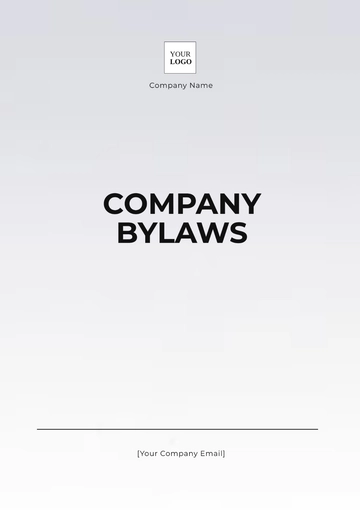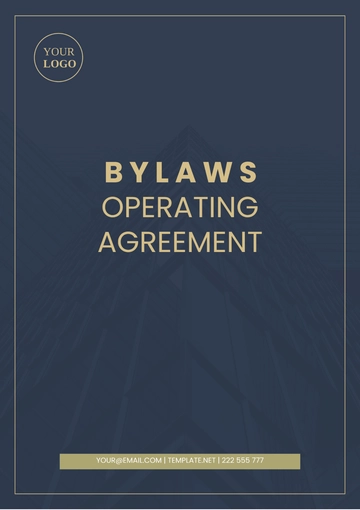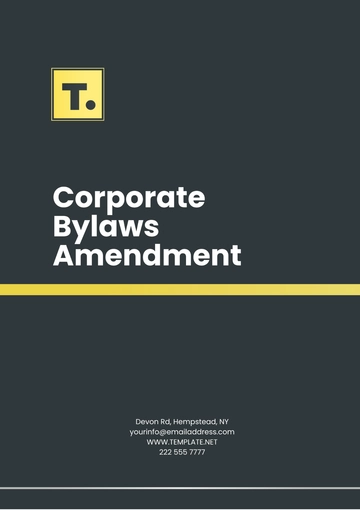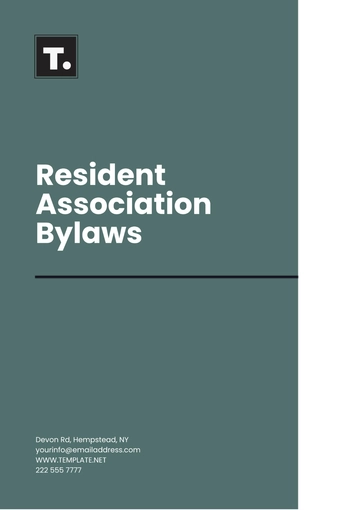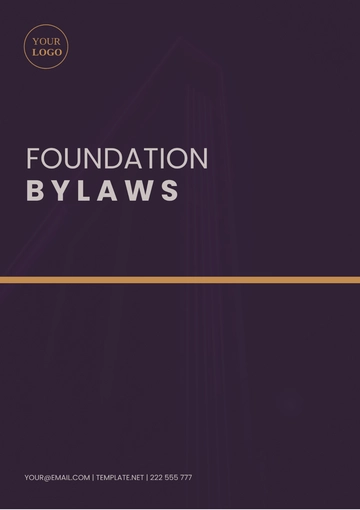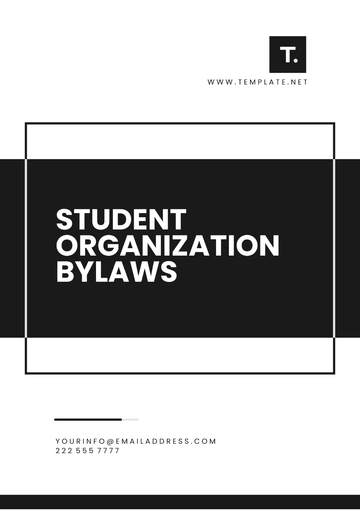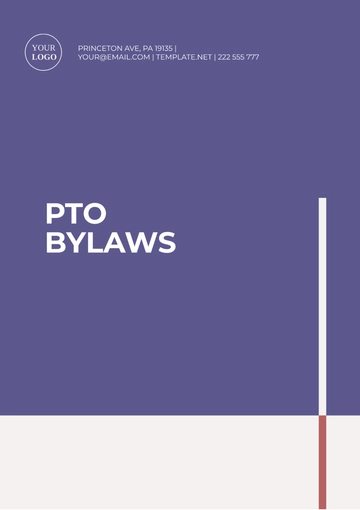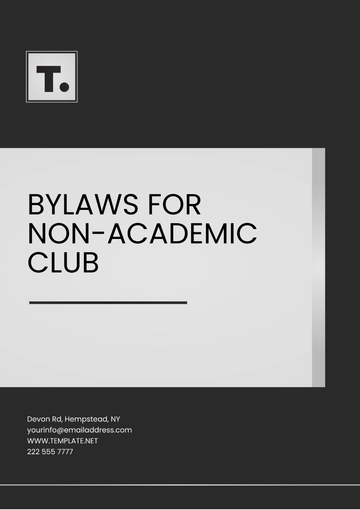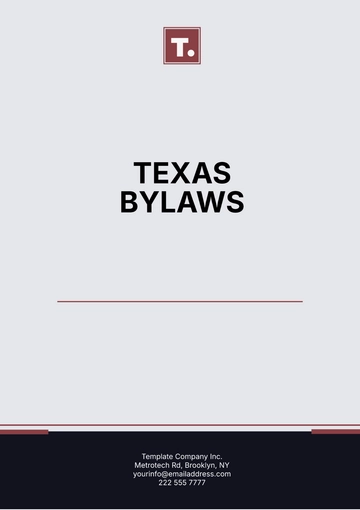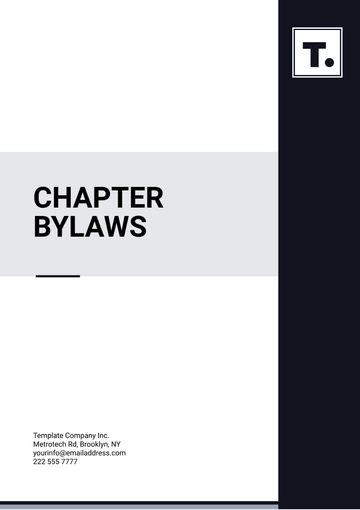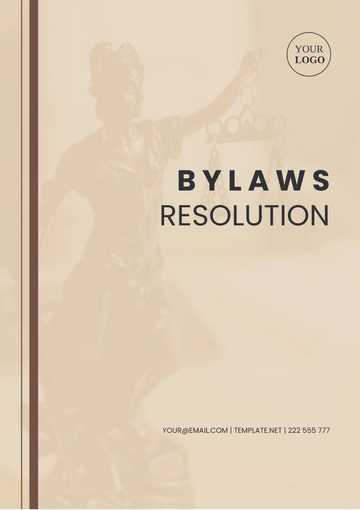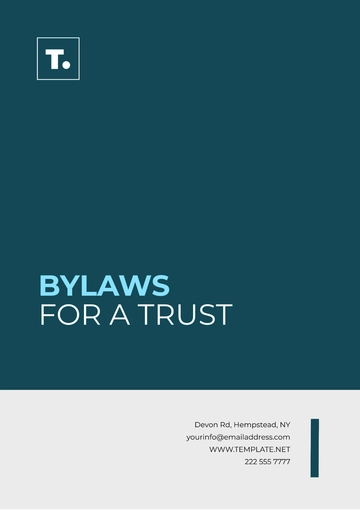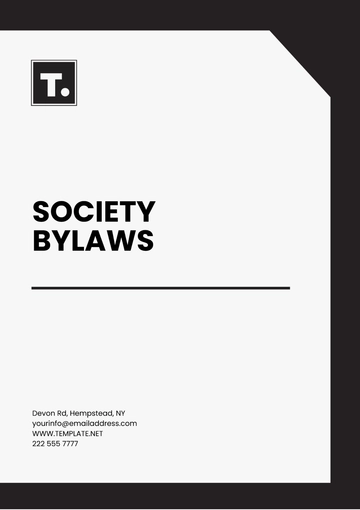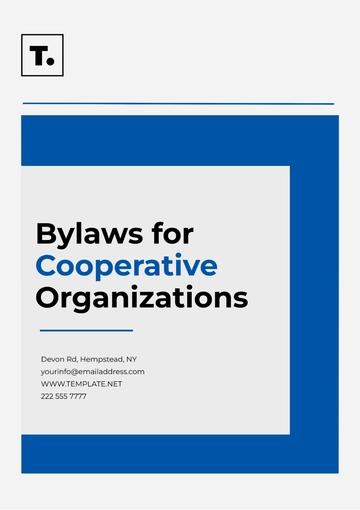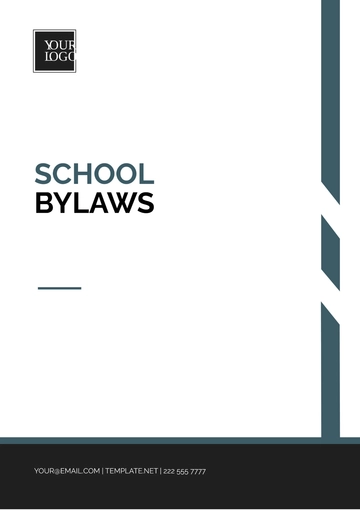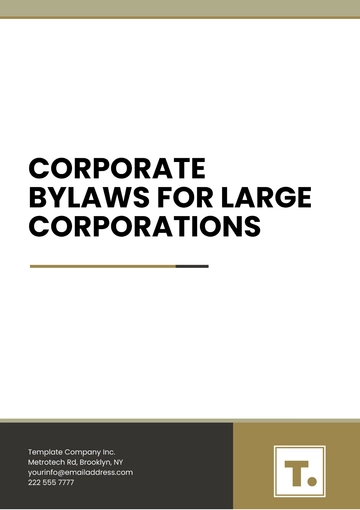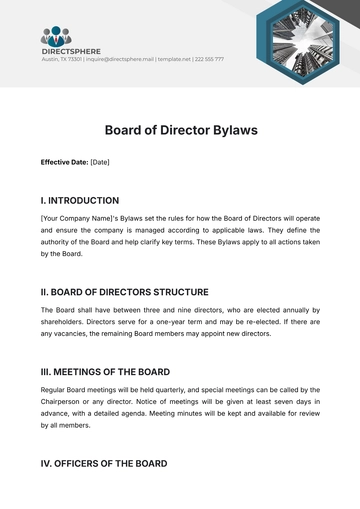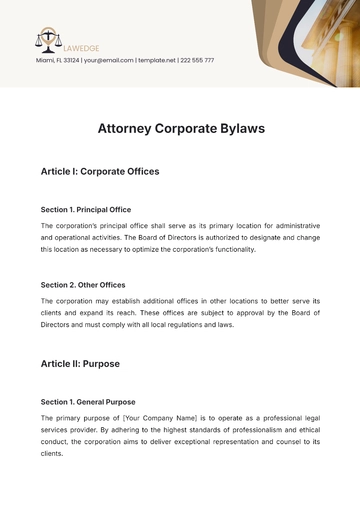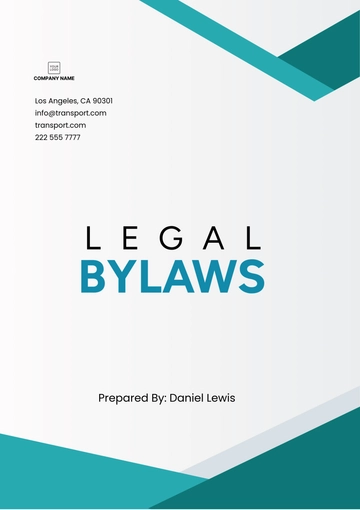Free Finra Bylaws
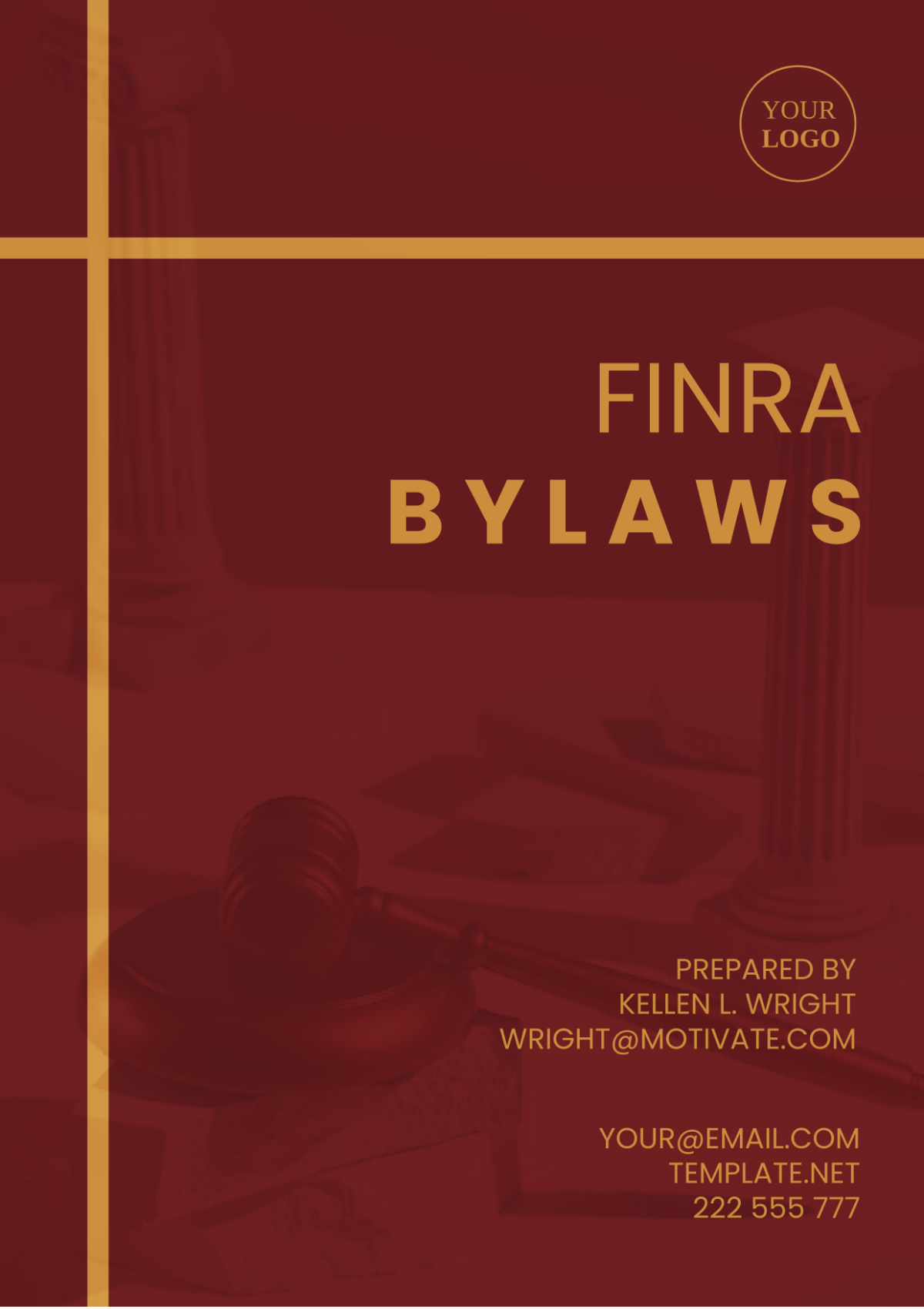
Article I: Membership
1.1 Eligibility for Membership
Any person or entity engaged in the securities business is eligible for membership in the Financial Industry Regulatory Authority (FINRA), subject to meeting the membership criteria as outlined in these Bylaws.
1.2 Application Process
Prospective members shall submit a complete application form along with all required documentation and fees as specified by FINRA. The Membership Committee shall review each application and make a determination based on the applicant's qualifications and compliance with FINRA rules.
1.3 Membership Categories
FINRA may establish different membership categories based on the nature of the business conducted by the member, such as broker-dealers, investment advisers, or clearing firms.
Article II: Standards of Conduct
2.1 Ethics and Integrity
Members and associated persons of FINRA must uphold the highest ethical standards, fostering trust, transparency, and professionalism. This entails:
Fair and equitable dealings with clients, colleagues, and stakeholders.
Timely disclosure and mitigation of conflicts of interest.
Preserving the industry's reputation through responsible decision-making.
2.2 Compliance
Strict adherence to all securities laws, including the Securities Exchange Act of 1934 and FINRA regulations, is imperative. This includes:
Compliance with advertising, communications, and supervision standards.
Adhering to state and local regulations relevant to business operations.
2.3 Confidentiality
Protecting client information is paramount, requiring:
Secure data handling and limited access to authorized personnel.
Using client data only for lawful business purposes with explicit consent.
Implementing robust measures against unauthorized access or disclosure.
Article III: Disciplinary Procedures
3.1 Violations
Any member found to have violated FINRA rules or engaged in conduct detrimental to the integrity of the securities markets may be subject to disciplinary action. Violations may include but are not limited to:
Misrepresentation of information or misleading practices.
Failure to comply with regulatory requirements or FINRA's Code of Conduct.
Market manipulation or insider trading activities.
Breach of fiduciary duties or unethical behavior affecting clients or the market.
Disciplinary actions may range from fines and suspensions to expulsion from membership, depending on the severity and recurrence of the violation.
3.2 Investigations
FINRA's Enforcement Division is responsible for conducting thorough investigations into alleged violations. This includes:
Gathering evidence through interviews, document reviews, and data analysis.
Collaborating with regulatory agencies, law enforcement, and industry experts as needed.
Ensuring a fair and impartial process while maintaining confidentiality and due diligence in handling sensitive information.
The goal of investigations is to establish facts, determine culpability, and recommend appropriate disciplinary measures based on the severity and impact of the violation.
3.3 Hearing and Appeals
Members facing disciplinary action have the right to a fair hearing before a FINRA hearing panel composed of impartial industry professionals. The hearing process includes:
Presenting evidence, witnesses, and arguments in defense of the accused member.
Cross-examination and rebuttals to challenge evidence and testimonies.
Adherence to procedural fairness, including notification of charges, access to legal representation, and timely hearings.
Article IV: Membership Fees and Dues
4.1 Assessment of Fees
FINRA reserves the right to assess membership fees, dues, and other necessary charges to sustain its operations and regulatory functions effectively. These assessments may vary based on membership category, business activities, and regulatory requirements.
The assessment of fees encompasses considerations such as:
Administrative costs associated with membership processing and oversight.
Regulatory examination and supervision expenses to ensure compliance.
Technology infrastructure and system maintenance for market surveillance and investor protection.
Funding initiatives for investor education, market transparency, and industry research.
4.2 Payment Schedule and Obligations
Members are obligated to remit fees and dues according to the schedule and amounts specified by FINRA. Timely payment is crucial to maintaining active membership status and access to regulatory benefits, including:
Participation in industry forums, training programs, and compliance resources.
Eligibility for regulatory examinations, audits, and reporting requirements.
Continued access to market data, trading platforms, and investor protection mechanisms.
Failure to pay fees as mandated by FINRA may result in disciplinary actions, including suspension or termination of membership. Members are responsible for ensuring compliance with payment obligations and promptly addressing any financial concerns or disputes with FINRA.
Article V: Governance and Administration
5.1 Board of Governors
The governance of FINRA is entrusted to a distinguished Board of Governors comprising seasoned industry professionals and public representatives. The Board's pivotal role encompasses:
Strategic oversight of FINRA's policies, initiatives, and regulatory framework to uphold market integrity and investor protection.
Evaluation and approval of major organizational decisions, including budget allocations, regulatory priorities, and leadership appointments.
Collaboration with industry stakeholders, government agencies, and the public to address emerging challenges, promote market transparency, and enhance regulatory effectiveness.
Accountability for maintaining high standards of governance, ethical conduct, and operational excellence within FINRA's mandate.
5.2 Committees
To facilitate effective governance and operational efficiency, FINRA establishes specialized committees tailored to key functions and priorities. These committees include:
Membership Committee: Responsible for evaluating membership applications, ensuring compliance with eligibility criteria, and recommending membership decisions to the Board of Governors.
Regulatory Policy Committee: Formulates regulatory proposals, assesses industry impact, and advises the Board on policy enhancements to address market trends and regulatory developments.
Nominating Committee: Facilitates the selection and nomination process for qualified candidates to serve on the Board of Governors, emphasizing diversity, expertise, and representation across industry sectors and public interests.
Each committee operates under defined charters, composition guidelines, and reporting mechanisms to promote transparency, expertise utilization, and informed decision-making.
5.3 Staff and Leadership
FINRA's operational effectiveness and regulatory stewardship are overseen by a dedicated Chief Executive Officer (CEO) and executive leadership team appointed by the Board of Governors. Their responsibilities encompass:
Executing strategic initiatives aligned with FINRA's mission, regulatory objectives, and industry best practices.
Managing day-to-day operations, regulatory programs, and enforcement activities to ensure market integrity, compliance, and investor protection.
Providing guidance and support to industry participants, investors, and stakeholders through educational outreach, regulatory guidance, and responsive services.
Upholding a culture of integrity, accountability, and professionalism across FINRA's workforce, fostering innovation, collaboration, and continuous improvement.
Article VI: Amendments
6.1 Amendment Process
The process for amending these Bylaws involves a deliberative and transparent approach, ensuring robust governance and stakeholder engagement. Key aspects of the amendment process include:
Proposal: Any proposed amendments to these Bylaws must be submitted to the FINRA Board of Governors for consideration. Proposals may originate from the Board, committees, or members and must be accompanied by a rationale and impact assessment.
Notice: Before the vote, notice of the proposed amendments must be provided to all members at least thirty days in advance. This allows sufficient time for review, feedback, and preparation for the voting process.
Discussion and Debate: During Board meetings or designated forums, members have the opportunity to discuss, debate, and seek clarifications on the proposed amendments. This fosters transparency, consensus-building, and informed decision-making.
Vote: The FINRA Board of Governors conducts a vote on the proposed amendments, requiring a majority vote for approval. The voting process may include electronic or in-person voting methods, ensuring accessibility and participation from all Board members.
6.2 Effective Date
Upon approval by the Board of Governors, amendments to these Bylaws become effective according to the specified timeline or conditions outlined in the amendment. The effective date may coincide with the conclusion of the Board meeting in which the amendments were approved or may be delayed to allow for implementation planning, communication, and transition as necessary.
The effective date of amendments is critical for ensuring clarity, compliance, and continuity in governance practices. It marks the commencement of new provisions, policies, or operational changes reflected in the amended Bylaws.
Article VII: Miscellaneous Provisions
7.1 Severability
If any provision of these Bylaws is deemed invalid or unenforceable by a competent legal authority, such determination shall not affect the validity or enforceability of the remaining provisions. The remaining provisions shall continue to be fully effective and enforceable to the fullest extent permitted by law.
7.2 Governing Law
These Bylaws shall be governed by and construed under the laws of the jurisdiction in which FINRA is headquartered. Any disputes arising from or relating to these Bylaws shall be resolved under the laws of the jurisdiction, and the courts of the jurisdiction shall have exclusive jurisdiction over such disputes.
- 100% Customizable, free editor
- Access 1 Million+ Templates, photo’s & graphics
- Download or share as a template
- Click and replace photos, graphics, text, backgrounds
- Resize, crop, AI write & more
- Access advanced editor
Effortlessly navigate financial market regulations with our Finra Bylaws Template on Template.net. Crafted for clarity and compliance, it's fully editable and customizable to adapt to your specific needs. Covering membership obligations to dispute resolution, this comprehensive template streamlines Finra compliance. Simplify adherence to regulations today with this versatile template, accessible via our AI Editor Tool for seamless customization.
